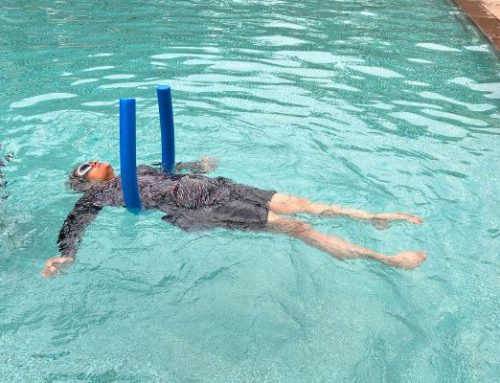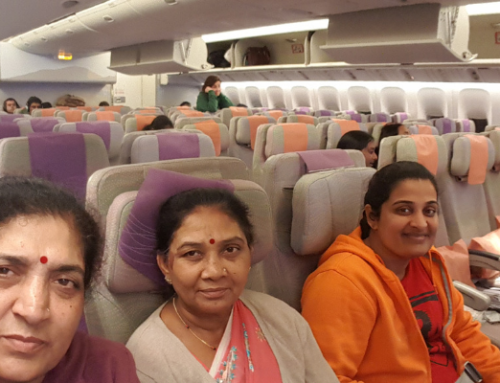8 tips for aging well with Spinal Cord injury
Some people look younger and healthier than their peers of the same age. That’s because at every stage of their life they have taken care of their health through proper diet and regular exercise. They’ve also maintained a balance between the heart and the mind through meditation and positive attitude.
Taking care of all the above is even more important for people with spinal cord injuries. We need to take far more care of our diet and exercise than others because of our inability to walk. Less movement of the body leads to difficulty in digesting food and the subsequent bowel management. Negligence also leads to a fat belly causing difficulty in transfers affecting mobility. Here are some tips that can help you age well with a spinal cord injury.
Author: Shivjeet Singh Raghaw, Peer Counsellor, Department of Rehabilitation, Indian Spinal Injuries Centre, New Delhi

1. Practice different exercises to stay fit
Exercise daily, do yoga and pranayama, and eat a balanced diet three times a day. Propel wheelchair yourself to the maximum possible distance. Pranayama and deep breathing provide mental peace, more oxygen resulting in better health of internal and external organs of the body. Regular exercise to maintain the muscle mass and strength is a must.
2. Manage bowel with a healthy diet
With time and age laxatives and suppositories become less effective causing delayed action and increase in the time for bowel management. Make changes in your diet as you age. Take less meat and consume more green vegetables, fruits and salad. Instead of bread choose high-fiber alternatives such as oatmeal and porridge.
Here’s my recommendation on a diet plan: In the morning when your stomach is empty, you can eat about 10 resins and 5 almonds that have been soaked overnight. The fiber in these dry fruits helps in making the stool softer. They also have some very essential vitamins and minerals. Cut down intake of tea and coffee to avoid dehydration that can compromise digestion and lead to a harder stool. Drink warm water and have more soup or milk. One meal in the day could be only a salad prepared with cucumber, tomato, onion, carrot, radish, papaya, and other raw vegetables.
If proper emptying of the bowel does not happen for two-three days, then go in for Enema. If bowel management becomes really problematic, one can go for colostomy. It is better if one shifts the bowel routine to after breakfast. This routine will kicksart the beginning of peristalsis (a wave-like muscle contractions that moves food to different processing stations in the digestive trac), strong reflexes in the colon and rectum, resulting in easier bowel movement.
3. Adopt appropriate bladder management techniques
Bladder management and care of associated organs is a must to identify undesirable changes and intervene timely. Get a KFT blood test once in 4-6 months and KUB ultrasound at least once a year. If Clean Intermittent Catheterization (CIC) is not possible due to too much dependency on someone else or any reason, then a procedure like Suprapubic Catheter (SPC) can be adopted instead of an Indwelling Urinary Catheter (IDC) or condom drainage. There is an increased risk of prostate gland enlargement and cancer in both in male and female due to prolonged use of indwelling catheter as well as frequent CIC.
4. Stay warm and keep infections away
Quadriplegics are prone to infection in respiratory organs more so in winters. One should wear two-three layers of cotton and woolen clothes and especially keep the chest covered using high neck pullovers and jackets. Keep warm using woolen socks and caps, and drink warm water, soup, coffee, tea, etc.
5. Watch out for symptoms of fatal complications
People with spinal cord injury must keep an eye on specific complications that could lead to a medical emergency such as:
Autonomic dysreflexia: This develops in individuals with a neurologic level of spinal cord injury at or above the sixth thoracic vertebral level (T6). Autonomic dysreflexia causes an imbalanced reflex sympathetic discharge, leading to potentially life-threatening hypertension.
Deep vein thrombosis (DVT) occurs when a blood clot (thrombus) forms in one or more of the deep veins in your body, usually in legs if you don’t move them for a long time. It can cause leg pain or swelling, but also can occur with no symptoms. DVT can be very serious because blood clots in your veins can break loose, travel through your bloodstream and lodge in your lungs, blocking blood flow (pulmonary embolism).M
Syringomyelia: The development of a fluid-filled cyst (syrinx) within your spinal cord. Over time, the cyst can enlarge, damaging your spinal cord and causing pain, weakness and stiffness, among other symptoms.
Septicemia: A serious bloodstream infection. Septicemia occurs when a bacterial infection elsewhere in the body, such as the UTI, chest or pressure sore, enters the bloodstream and reaches all organs resulting in death.
6. Get health checkups at regular intervals
Health check ups at regular intervals for timely intervention arising because of high blood pressure, fat deposits in arteries, heart diseases, chest, liver and kidney complications. After the age of 40 start taking calcium and Vitamin D, to check Osteoporosis and Vit. B12 to strengthen nerves.
7. Keep your mind engaged to live well
Apart from all the above, to live well with a calm mind and happiness, it is also important to participate in some religious activity, spend some time of your day in worship and meditation, listen to hymns, read religious and spiritual books. Other family members and friends are busy with their work and responsibilities and are unable to spend much time with old people. You should make full use of this solitude; being dependent on someone else to be happy is not right. Resume any of your good old hobbies whether it is reading, writing, or listening to stories and poems. You can start writing your autobiography. If you are fond of music, try learning a new musical instrument, learn to paint. So much can be done to keep oneself busy and happy. Make a group of old friends on social media and chat with them, the internet has all the options for information. Do not go by someone else choice, you should do what you like to do.
8. Share what you have and help others
Try helping other needy people, who are not fortunate enough, visit some NGO doing good work and spend time with inmates. There are enough ways, choose one or more and move ahead; all despair, loneliness, bitterness will be gone, and you will not realize how time passes away.





